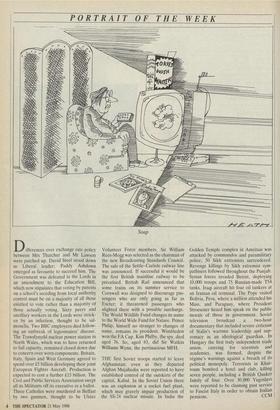PORTRAIT OF THE WEEK
Soap Differences over exchange rate policy between Mrs Thatcher and Mr Lawson were patched up. David Steel stood down as Liberal leader; Paddy Ashdown emerged as favourite to succeed him. The Government was defeated in the Lords in an amendment to the Education Bill, which now stipulates that voting by parents on a school's seceding from local authority control must be on a majority of all those entitled to vote rather than a majority of those actually voting. Sixty peers and ancillary workers in the Lords were' strick- en by an infection, thought to be sal- monella. Two BBC employees died follow- ing an outbreak of legionnaires' disease. The Trawsfynydd nuclear power station in North Wales, which was to have returned to full capacity, remained closed down due to concern over worn components. Britain, Italy, Spain and West Germany agreed to spend over £5 billion developing their joint European Fighter Aircraft. Production is expected to cost a further £15 billion. The Civil and Public Services Association swept all its Militants off its executive in a ballot. Three Catholics were murdered in Belfast by two gunmen, thought to be Ulster
Volunteer Force members. Sir William Rees-Mogg was selected as the chairman of the new Broadcasting Standards Council. The sale of the Settle—Carlisle railway line was announced. If successful it would be the first British mainline railway to be privatised. British Rail announced that some trains on its summer service to Cornwall was designed to discourage pas- sengers who are only going as far as Exeter; it threatened passengers who alighted there with a possible surcharge. The World Wildlife Fund changes its name to the World Wide Fund for Nature. Prince Philip, himself no stranger to changes of name, remains its president. Wimbledon won the FA Cup. Kim Philby, the spy, died aged 76. So, aged 83, did Sir Watkin Williams Wynn, the pertinacious MFH.
THE first Soviet troops started to leave Afghanistan; even as they departed Afghan Mujahedin were reported to have established control of the outskirts of the capital, Kabul. In the Soviet Union there was an explosion at a rocket fuel plant, which may gravely impair production of the SS-24 nuclear missile. In India the Golden Temple complex in Amritsar was attacked by commandos and paramilitary police; 50 Sikh extremists surrendered. Revenge killings by Sikh extremist sym- pathisers followed throughout the Punjab. Syrian forces invaded Beirut, deploying 10,000 troops and 75 Russian-made T54 tanks. Iraqi aircraft hit four oil tankers at an Iranian oil terminal. The Pope visited Bolivia, Peru, where a million attended his Mass, and Paraguay, where President Stroessner heard him speak on the public morals of those in government. Soviet television broadcast a two-hour documentary that included severe criticism of Stalin's wartime leadership and sup- remacy as an ideological guardian. In Hungary the first truly independent trade union, catering for scientists and academics, was formed, despite the regime's warnings against a breach of its political monopoly. Terrorists in Khar- toum bombed a hotel and club, killing seven people, including a British Quaker family of four. Over 30,000 Yugoslays were reported to be claiming past service to Fascist Italy in order to obtain Italian






























































 Previous page
Previous page